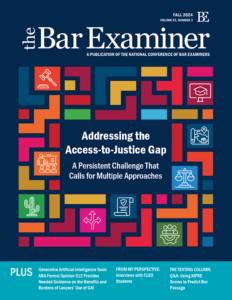This article originally appeared in The Bar Examiner print edition, September 2014 (Vol. 83, No. 3), pp. 51–56.
Erratum: The June 2014 Litigation Update, page 42, inaccurately summarized the recommendation of the Supreme Court of Ohio Board of Commissioners on Character and Fitness in In re Application of Daubenmire. The text of the Litigation Update stated that the board recommended that Daubenmire be allowed to take the July 2014 exam. However, the board’s recommendation was that Daubenmire be allowed to reapply as a candidate for the July 2014 exam.
By Fred P. Parker III and Jessica GladAmericans with Disabilities Act
Reasonable accommodations
Rawdin v. American Board of Pediatrics, 985 F. Supp. 2d 636 (E.D. Pa. 2013)
The United States District Court for the Eastern District of Pennsylvania denied a pediatrician’s request for injunctive relief in a suit brought against the American Board of Pediatrics (ABP), holding that the pediatrician did not qualify for accommodations under the Americans with Disabilities Act (ADA), and that the accommodations he requested for taking the ABP’s certifying examination were not reasonable.
David Rawdin was diagnosed with a brain tumor in 1987, when he was an undergraduate. He underwent brain surgery to remove the tumor and was treated with radiation and chemotherapy. After completing his cancer treatment, Rawdin began experiencing difficulty taking multiple-choice examinations. Despite these difficulties, he graduated from college in 1990 and from medical school in 1994.
After graduating, Dr. Rawdin was required to take the third and final step of the United States Medical Licensing Examination (USMLE) to receive a medical license. Dr. Rawdin had passed the first two steps of the USMLE during medical school. However, he was unable to pass the third step of the exam despite two attempts.
Following his second failed attempt in 1996, Dr. Rawdin was evaluated by a neuropsychologist, who diagnosed him with “a cognitive impairment impacting his memory retrieval system.” According to the neuropsychologist, “Dr. Rawdin’s verbal retrieval function, visual memory system, and visual fine motor function were all significantly impaired by the tumor and subsequent treatment.” The neuropsychologist opined that these impairments adversely impacted Dr. Rawdin’s ability to complete multiple-choice examinations but had no effect on his ability to practice medicine in a clinical setting.
Later that same year, Dr. Rawdin’s brain tumor reoccurred and he underwent additional surgery and treatment. After suffering a series of complications, Dr. Rawdin left the medical profession for four years and changed his residency from surgery to pediatrics.
In 1999, Dr. Rawdin applied to retake the third step of the USMLE and for the first time requested test accommodations for the exam. His request was approved and he was granted 100% extended testing time, a private room, and additional stop-the-clock rest breaks. Dr. Rawdin passed Step III and received his medical license in 2000.
In 2003, after completing his pediatric residency, Dr. Rawdin started his clinical practice at the Children’s Hospital of Philadelphia (CHOP). CHOP’s bylaws require physicians employed by the hospital to be board certified in their specialties within five years of commencing employment. Dr. Rawdin satisfied all of the requirements for board certification, except for passing the General Pediatrics Certifying Exam (the Exam), a 335-question multiple-choice examination administered by the ABP.
Dr. Rawdin took the Exam four times between 2004 and 2009. In October 2007, following his second failed attempt to pass the Exam, Dr. Rawdin was reevaluated by the same neuropsychologist who had assessed him in 1996. Results from neuropsychological assessment measures administered for the 2007 evaluation revealed statistically significant variability between his cognitive functioning scores. While the discrepancies between scores demonstrated relative strengths and weaknesses, no score areas were below average. Based on the assessment results, the neuropsychologist diagnosed Dr. Rawdin with Cognitive Disorder Not Otherwise Specified (NOS). Dr. Rawdin subsequently failed the Exam two more times before CHOP terminated his employment in January 2010 for failing to obtain board certification.
In September 2010, Dr. Rawdin wrote to ABP about his difficulties with passing the Exam and requested an alternative method of certification. ABP responded that it could not waive the Exam requirement because it would compromise the uniform standard for certification. However, it suggested that Dr. Rawdin submit a request for test accommodations under the ADA.
Dr. Rawdin applied to take the Exam again in 2011, but this time requested test accommodations. In support of his request, Dr. Rawdin submitted a letter from his neuropsychologist confirming his diagnosis, describing his functional limitations, and recommending that he receive the following test accommodations: extended testing time, a quiet testing room, advance knowledge of the material covered on the Exam, access to reference material while taking the Exam, stop-the-clock rest breaks every 30 minutes, and an essay format for the Exam instead of multiple-choice questions.
ABP approved Dr. Rawdin for the same accommodations that he had received on the third step of the USMLE—100% extended testing time, a private room, and additional stop-the-clock rest breaks. However, Dr. Rawdin’s remaining requests were denied on the grounds that such modifications would jeopardize examination security, fundamentally alter the examination, and impose an undue burden. In October 2011, Dr. Rawdin failed the Exam for the fifth time.
Dr. Rawdin subsequently filed suit alleging that the ABP had violated the ADA by failing to accommodate his disability. He moved for a preliminary and permanent injunction, asking the court to order ABP to grant him board certification without requiring him to pass the Exam or, alternatively, to order ABP to provide a testing accommodation in the form of an alternate exam format.
On November 6, 2013, the court entered judgment denying Dr. Rawdin’s request for relief. Although the court agreed that Dr. Rawdin has a mental impairment that impacts the major life activities of test-taking and working, it concluded that Dr. Rawdin’s impairment does not substantially limit his abilities so as to qualify for accommodations under the ADA. The court explained that “[w]hether an individual’s limitation is substantial is measured in comparison to ‘most people,’” and therefore it “must compare Dr. Rawdin not with other test-takers or doctors taking a certification exam, but with members of the general population.” The court acknowledged that Dr. Rawdin’s scores from the assessment measures administered for the 2007 evaluation “show a relative impairment between his overall IQ and his results related specifically to his memory.” However, “a relative impairment is not enough to qualify Dr. Rawdin as disabled because the Court must compare his test scores and test-taking ability against the general population and not against his own expected capabilities.” The court noted that despite his relative weakness, Dr. Rawdin’s “test scores are all either in the average or above average range.” Because “[t]he objective measures of Dr. Rawdin’s cognitive function place[] him within normal ranges,” the court concluded that “Dr. Rawdin’s memory impairment cannot be said to substantially limit his test-taking ability compared to the general population.”
The court went on to hold that even if Dr. Rawdin was substantially limited compared to most people, he still would not be entitled to the requested accommodations because they were not reasonable. The court noted that ABP had presented evidence demonstrating that waiving the examination requirement would “fundamentally alter the nature of the certification process,” and changing the format of the Exam or allowing Dr. Rawdin to take it open-book “would alter the Exam such that it no longer tests knowledge to the extent the current Exam does.” In contrast, the court stated, “Dr. Rawdin presented no evidence, and there is no evidence on the record, that an alternative format would not result in a fundamental alteration and would serve the intended goal of the Exam.” The court also noted that ABP had “credibly demonstrated [that] a change in format would be an undue burden based on the cost of developing a new Exam in an entirely different format or even just developing new questions.” Finally, the court stated, “ABP did provide Dr. Rawdin the accommodations of double time, a separate testing space, and off the clock breaks. In light of the accommodations provided, this Court cannot conclude [that] ABP failed to make reasonable accommodations because it did not offer Dr. Rawdin the chance to take the Exam open-book or in a different format.” Accordingly, while the court expressed its admiration for what Dr. Rawdin had accomplished, it found that he was not entitled under the law to injunctive relief.
Bar Admission
Conditional admission; reinstatement
In re B.R.C., 2014 WI 23, 353 Wis. 2d 435, 846 N.W.2d 7 (WI 2014)
In a matter of first impression, the Wisconsin Supreme Court considered a petition for reinstatement filed by an attorney who was suspended for failure to comply with the terms of his conditional admission.
B.R.C. graduated from a Wisconsin law school in the spring of 2011, and subsequently applied for admission to the state bar. Aspects of B.R.C.’s bar application raised character and fitness concerns regarding his alcohol use. Following an evaluation, the Board of Bar Examiners (BBE) offered B.R.C. conditional admission subject to terms set forth in a Consent Agreement For Conditional Admission (Consent Agreement). The Consent Agreement required B.R.C. to successfully complete two years of monitoring by the Wisconsin Lawyers Assistance Program (WisLAP) and “[t]o submit to random urinalysis testing for alcohol or other drugs as determined appropriate by the [WisLAP] Coordinator.” B.R.C. accepted the offer, signed the Consent Agreement on December 27, 2011, and was sworn in on January 18, 2012.
In March 2012, a WisLAP manager informed B.R.C. that he also needed to sign a separate Monitoring Contract with WisLAP. The Monitoring Contract contained additional terms not included in the Consent Agreement, such as requiring that B.R.C. consent to hair follicle, fingernail, and blood testing. B.R.C. refused to sign the agreement, asserting that he should have been informed about the more expensive testing permitted by the WisLAP Monitoring Contract before he executed the Consent Agreement. The BBE was informed of B.R.C.’s refusal to sign the Monitoring Contract.
In May 2012, the BBE voted to rescind B.R.C.’s conditional admission. The BBE requested the Wisconsin Supreme Court to issue an order to show cause as to why B.R.C.’s license should not be suspended. The order was issued, and B.R.C. filed a response.
Via order dated July 2, 2012, the Supreme Court informed B.R.C. that he had 14 days to sign the WisLAP Monitoring Contract or his license would be suspended. The Court also directed the BBE to ensure that all future applicants offered conditional bar admission receive a copy of the WisLAP Monitoring Contract prior to accepting conditional admission. The BBE revised its policies accordingly.
In July 2012, approximately six months after he was sworn in, B.R.C. signed the Monitoring Contract. Later on the same day, WisLAP informed B.R.C. that it had changed its third-party administrator, which required execution of a new contract. The two contracts were the same except for the administrator’s name and the initiation and completion dates—the first contract listed the dates as January 2012 to January 2014, whereas the second contract listed the dates as July 2012 to July 2014.
Shortly after signing the second contract, B.R.C. noticed the revised completion date and contacted the BBE to challenge the revision. B.R.C. argued that, as per the terms of the original agreement, the two-year monitoring period expired in January 2014. The BBE disagreed, noting that B.R.C. did not sign the Monitoring Contract until July 2012, thereby rendering the expiration of the two-year term in July 2014. B.R.C. persisted with his objections, and the BBE sought suspension. On August 14, 2012, B.R.C.’s license was suspended for his continued refusal to abide by the terms of his conditional admission.
B.R.C. petitioned for reinstatement on October 12, 2012. The BBE recommended that the suspension continue for a year, after which B.R.C. could petition for reinstatement, but only if he underwent a comprehensive psychological assessment. B.R.C. opposed the request for a psychological assessment, and a referee was appointed to consider the petition. On October 16, 2013, after conducting additional proceedings and holding an evidentiary hearing, the referee filed a report recommending reinstatement subject to B.R.C.’s continued monitoring by WisLAP until July 2014.
The BBE appealed, arguing that a comprehensive psychological assessment should be required because of “a long series of events that [had] occurred with B.R.C. over the course of the last two years.” At a minimum, the BBE asserted, B.R.C. should complete an additional two years of monitoring by WisLAP. B.R.C. disagreed, asking that his law license be reinstated without any conditions.
The Court concluded that the record supported the referee’s findings and conclusions and ordered B.R.C.’s reinstatement subject to continued monitoring by WisLAP until July 2, 2014. The record demonstrated that B.R.C. had not used alcohol since July 2, 2012. However, the Court noted that B.R.C. “kept practicing law for some six months with no monitoring or oversight in direct contravention of the essential terms of his conditional admission.” “With respect to the end date of [B.R.C.’s] monitoring,” the Court concluded, “it begs credulity to think the court would simply excuse six months of noncompliance with oversight the BBE had deemed necessary to ensure [B.R.C.] could be safely recommended to the public.”
A comprehensive assessment was not required, the Court explained, based on the referee’s determination that concerns over B.R.C.’s personality and psychological health were “not sufficiently well founded” to require psychological testing. While the Court agreed that “B.R.C. must complete the full two years of monitoring as his conditional admission originally required,” it concluded that there was “insufficient cause to warrant extending the conditions imposed on B.R.C. past July 2, 2014.” However, the Court reserved the right to reconsider its decision “[i]f B.R.C. fails to comply with the terms of his monitoring contract before it terminates.” The Court accepted “the referee’s conclusion that B.R.C. has demonstrated character and fitness sufficient to warrant his admission to the bar subject to successful completion of the monitoring contract.” Thus, “[u]pon completion of the monitoring contract [B.R.C.] will be deemed admitted, without conditions,” the Court concluded.
Right of access to state bar admissions database
Sander v. State Bar of California, 58 Cal. 4th 300, 314 P.3d 488 (CA 2013)
In a unanimous decision, the California Supreme Court ruled that the public has a common-law right of access to the information contained in the California State Bar’s admissions database, provided that the information can be compiled in a form that protects applicants’ privacy and that “no countervailing interest outweighs the public’s interest in disclosure.”
Professor Richard Sander, of the University of California, Los Angeles School of Law, submitted a records request to the California State Bar for release of admissions data with any identifying information redacted. Sander sought the data to conduct research regarding racial disparities in bar passage rates and law school grades. The State Bar’s Committee of Bar Examiners rejected the request, citing, among other reasons, privacy concerns.
Sander filed a revised request, proposing that certain types of data be “clustered” so that information from the database could not be used in conjunction with information in the public domain to discern an individual’s identity. Again, the State Bar refused.
Sander sued, seeking to compel the State Bar to provide the data. The trial court found in favor of the State Bar, the Court of Appeal reversed, and the California Supreme Court granted review.
In rendering its decision, the Court considered the rules and statutes that provide public access to government records and information. The Court concluded that the statutes directly applicable to the State Bar neither demand nor prohibit access to the admissions database. The Court noted that the California Public Records Act (CPRA) does not apply to bar records, because the State Bar is part of the judicial branch, which is expressly exempt from the scope of the CPRA. However, although “[t]he courts were made exempt from most provisions of the CPRA,” the Court explained, “the Legislature explicitly preserved existing law regarding ‘the status of judicial records as it existed immediately prior to the effective date of this section.’” Therefore, the State Bar is subject to the common law governing public access to court records.
The scope of the common law regarding such access is summarized in Copley Press, Inc. v. Superior Court, 6 Cal. App. 4th 106, 7 Cal. Rptr. 2d 841 (1992). Copley Press identified three categories of documents typically used in courts: (1) judicial records, in which the public and press have a justifiable interest and which are presumptively accessible to the public; (2) informal and preliminary writings, which are not subject to the right of public access because they are not final decisions; and (3) documents that are on the margin of the first two categories. In deciding whether the third category of documents is subject to a right of access, the Copley Press court focused on “the usefulness of the records and thereby on the public’s interest in access to those records.” Applying these principles, the Court found that the State Bar’s database falls within the third category of “marginal” court documents identified in Copley Press.
The Court also concluded that “the public’s interest in the information in the database would contribute to the public’s understanding of the State Bar’s admissions activities, and is sufficient to warrant further consideration of whether any countervailing consideration weighs against public access.” The Court stated that “it seems beyond dispute that the public has a legitimate interest in whether different groups of applicants, based on race, sex[,] or ethnicity, perform differently on the bar examination and whether any disparities in performance are the result of the admissions process or of other factors.”
The Court acknowledged that existing regulations “confirm that . . . [State Bar] applicants have some expectation of privacy in their records,” but it rejected the State Bar’s suggestion that the State Bar rule making applicant records confidential “unless required to be disclosed by law . . . or authorized by the applicant in writing for release to others” prohibits disclosure of the admissions database records. Disclosure of information does not impair an applicant’s privacy interests if the applicant cannot be identified by the information, the Court explained. In practice, the Court noted, the State Bar itself “does not interpret its rule as requiring that de-identified information from applicant records be kept completely confidential,” as it regularly publishes statistical reports based on information from applicant records without identifying individual applicants.
The Court stated that it could not “hold as a matter of law that bar applicants’ constitutional rights of privacy preclude disclosure of the information in the database even in a de-identified form.” The Court explained that “[b]ecause the trial court concluded that there was no legal basis for requiring disclosure of the admissions database, the parties did not litigate, and the trial court did not decide, whether and how the admissions database might be redacted or otherwise modified to protect applicants’ privacy and whether any countervailing interests weigh in favor of nondisclosure.” The Court therefore affirmed the judgment of the Court of Appeal with directions to remand the case to the trial court for further proceedings.
 Fred P. Parker III is Executive Director Emeritus of the Board of Law Examiners of the State of North Carolina.
Fred P. Parker III is Executive Director Emeritus of the Board of Law Examiners of the State of North Carolina.
 Jessica Glad is Staff Attorney for the National Conference of Bar Examiners.
Jessica Glad is Staff Attorney for the National Conference of Bar Examiners.
Contact us to request a pdf file of the original article as it appeared in the print edition.







